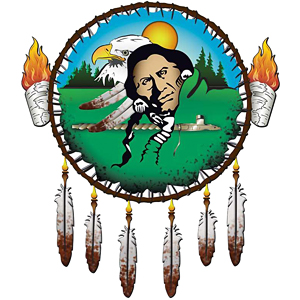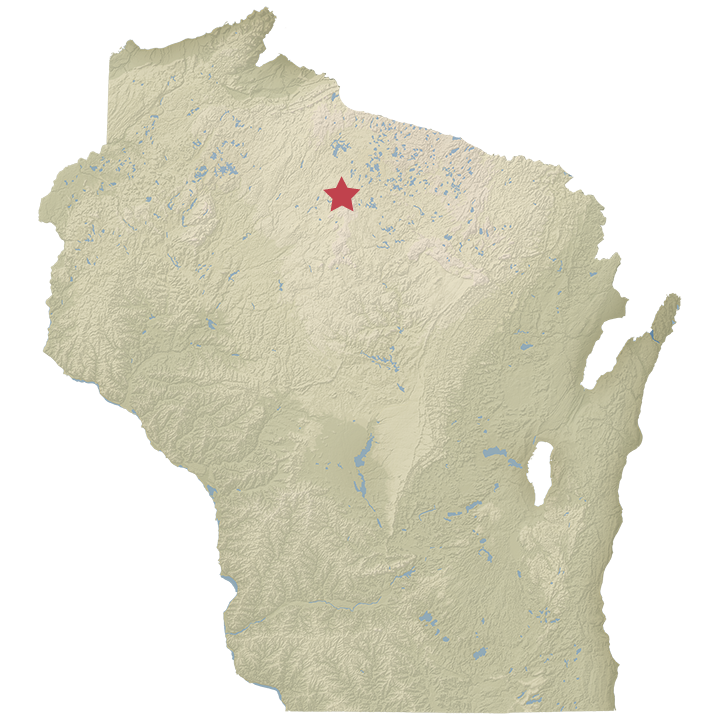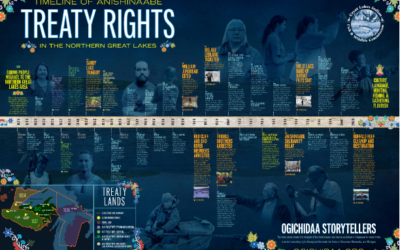
Brief History
The Lac du Flambeau Band of Lake Superior Chippewa has inhabited the Lac du Flambeau, Wisconsin area since 1745 when Chief Keeshkemun led the band to the area. The Lac du Flambeau is one band of the large Ojibwe Nation that originally occupied the upper eastern woodlands area of the present-day United States and Canada. They are one of six bands of Ojibwe, or Chippewa in the state of Wisconsin.
The band acquired the name Lac du Flambeau, or “Lake of the Torches” which refers to the gathering practice of spearing fish at night by the light of birchbark torches. The name Lac du Flambeau was given to the band by the French traders and trappers who visited the area.
The Lac du Flambeau Indian Reservation was officially established by the 1854 Treaty of La Pointe. The 1854 Treaty also established reservations for other Ojibwe bands of Wisconsin, including Bad River, Red Cliff, and Lac Courte Oreilles; the other two Ojibwe bands are the St. Croix and Mole Lake Nations. The influx of settlers into Wisconsin progressively displaced the Ojibwe from their traditional use of the ceded lands. The 1854 Treaty set aside 200 acres on Madeline Island for traditional gathering practices for its members. This island is a longtime capital and cultural or religious center of the Ojibwe people and nations throughout the Great Lakes region.
The area was continually logged in the following years and became a tourist destination for families from southern Wisconsin and Illinois around the turn of the 20th century. One reason for the area being such a popular tourist destination is because the Lac Du Flambeau Nation is located in the Northern Highland Lake District, with 260 lakes surrounded by old-growth and forest lands.
To increase economic activity and foster self-reliance, the Lac du Flambeau Band of Lake Superior Chippewa began bingo and gaming operations. The revenues generated by the gaming operations go to the nation and directly benefit the economic and social development of the community. Gaming operations have enhanced not only the economy of the Lac du Flambeau community but the surrounding Lakeland area communities as well.
Present Day
Today, the Lac du Flambeau Band of Lake Superior Chippewa is the largest employer in Vilas County. Economic enterprises within the tribal nation include tribal administration, a health care clinic, social services, a gaming/lodging/meeting/center facility, a public library, natural resources department, gas and grocery stores, a roads department, and water and sewer departments, among others.
There are many year-round recreational opportunities in the Lac du Flambeau area, including fishing, water skiing, and boating in the summer. During the winter months, the Nation’s wooded trails and snow-covered lakes are perfect for snowmobiling and cross-country skiing.
The Lac du Flambeau Band of Lake Superior Chippewa have their own law enforcement department. They have an agreement with the Vilas County Sheriff’s Department regarding transportation and jail housing. The Lac du Flambeau Band of Lake Superior Chippewa judiciary branch includes one trial judge, associate judges as deemed necessary by the tribal council, and when the need arises, three appellate court judges. Legal counsel must pass the bar to practice before the Lac du Flambeau Court System. The tribal court system handles cases such as conservation/natural resources, children and families, health, safety and welfare, civil, divorce, custody, child support, domestic abuse, small claims, replevin (a legal remedy whereby seized goods may be provisionally restored to their owner), and recognition of foreign orders.
For additional information about the Lac du Flambeau Band of Lake Superior Chippewa, consider the following resources:
- Lac du Flambeau Band of Lake Superior Chippewa
- Hunting Deer: Sharing the Harvest
- PBS Wisconsin Tribal Histories – Lac du Flambeau Ojibwe History
The essay was altered and reprinted with permission from the Wisconsin Department of Public Instruction






